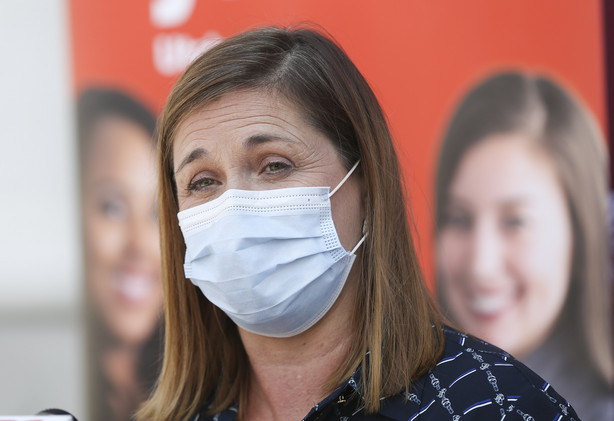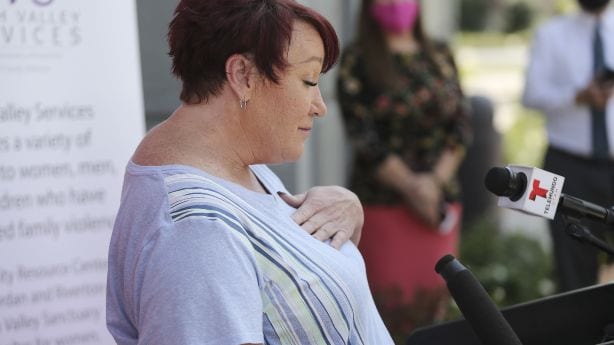WEST JORDAN — When she was homeless, Rebecca Thomas slept on the street during the day so she could keep an eye out for any trouble headed her way at night.
Thomas, 57, had fallen into a pattern of substance abuse after being assaulted and robbed in 2018, she said Wednesday. But she couldn’t stay focused on recovering from addiction or improving her mental health until advocates helped her find a place to stay.
“The minute I got into stable housing, it changed my life,” she said, cheering the Wednesday announcement of a roughly $220,000 infusion of federal relief funds for two Utah nonprofits serving survivors of abuse.
Salt Lake County is passing the money onto South Valley Services and YWCA Utah, a move advocates said would help them meet a surge in domestic violence calls and financial need. Much of the money will go toward helping victims find housing and covering rent or utilities so they can stay away from their aggressors.
Salt Lake County Mayor Jenny Wilson said the challenges children and families face have been top of her mind since the outbreak began in March, when many were asked to stay home even though they were afraid to do so.
The money “will help these organizations mitigate the tragedy of domestic violence during COVID-19,” Wilson told reporters Wednesday.
Data confirms the danger, she said.
The minute I got into stable housing, it changed my life.
–Rebecca Thomas
–Rebecca Thomas
Prosecutors are handling 21% more domestic violence cases in Salt Lake County, while 911 dispatchers reported a nearly 30% rise in calls. Calls to the Utah Domestic Violence Coalition have jumped 25%, Wilson added.
Nonprofits throughout the state received an earlier boost in federal relief money after a Utah lawmaker helped secure about $2 million to support services for those fleeing abusive homes.
While some of the money has paid for hotel rooms as shelters have cut capacity, others have used it to equip counselors and others with tablets or laptops so they can still connect with clients over video.

Jennifer Campbell, executive director for South Valley Services, said the county’s help was “desperately needed,” and her organization can now help up to about 90 families cover housing costs.
“They need a safe and stable home, and this reduces shelter overflow and increases long-term success,” Campbell said. The federal money will also help the nonprofit staff its crisis line and provide free mental health services, she added.
Liz Watson, program director at the Family Justice Center, said the pandemic has not simply led to more frequent abuse within households. It also has amplified the severity.
And it’s taken away coping mechanisms like the chance to go to work and spend several hours at a time away from an abuser, or the ability to visit family and friends.
While many of the state’s youngsters have returned to school and their parents to work, Watson said she expects the fallout to continue. She emphasized her nonprofit and others remain open to help in person and over the phone.
“The impacts are going to be felt for years to come,” she said.
Domestic violence resources
More stories you may be interested in
This content was originally published here.

